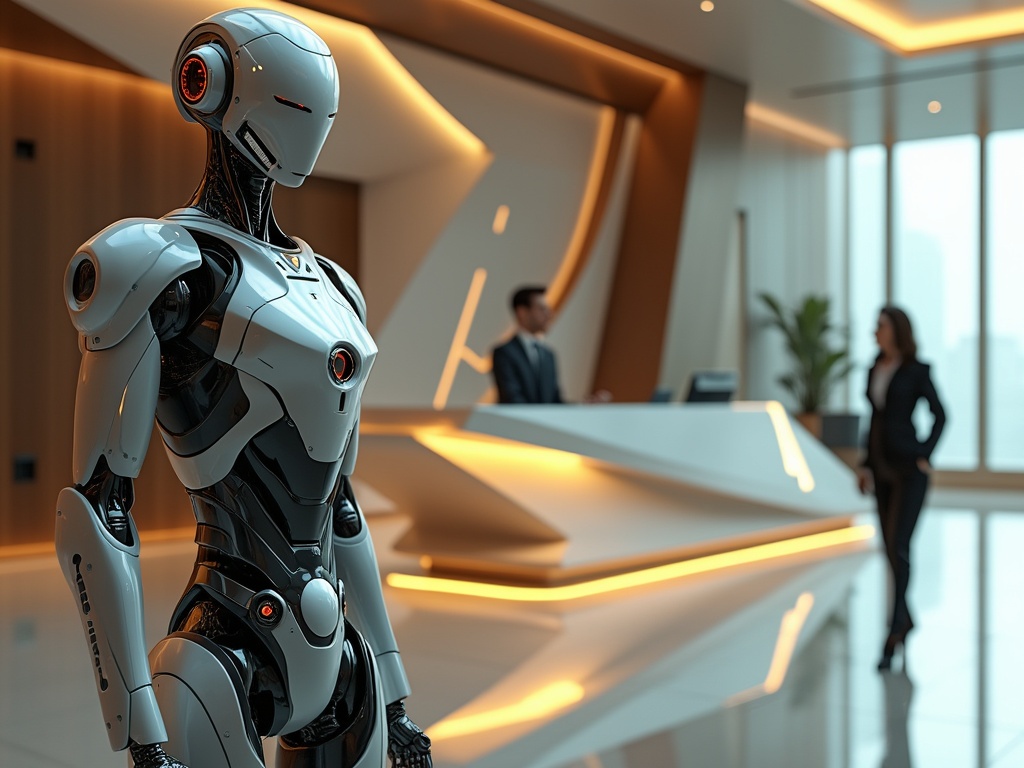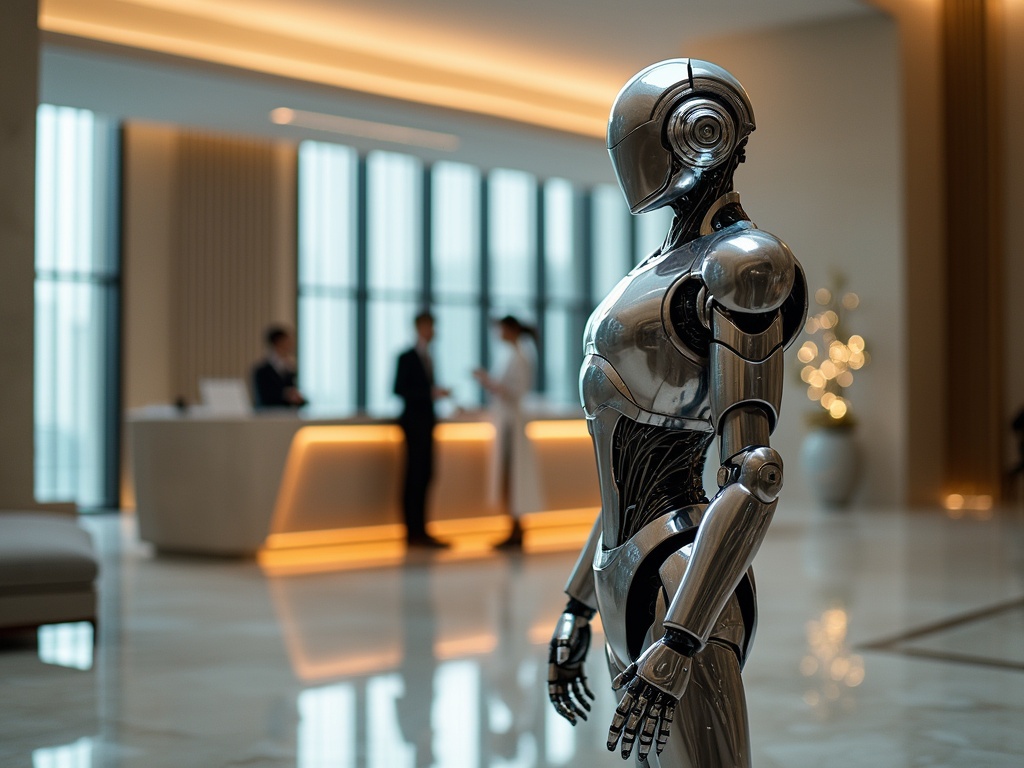Digital Assistants in Hospitality: Transforming Guest Experience
Imagine checking into a hotel where a virtual concierge knows your preferences before you arrive, adjusts your room temperature to perfection, and provides instant assistance in your native language—all without human intervention. This is the reality of digital assistants in the hospitality industry today.
According to a recent study, 85% of customer interactions will be managed without human intervention by the end of 2023. This shift is changing how hotels connect with guests, streamline operations, and deliver personalized experiences.
From AI-powered chatbots handling real-time queries to virtual concierges managing room service and local recommendations, digital assistants are becoming essential in modern hospitality. This technological evolution brings exciting opportunities and challenges for hoteliers.
We’ll explore how these intelligent assistants reshape guest experiences, their impact on operational efficiency, and the balance between automation and the human touch that defines exceptional hospitality. Whether you’re a hotelier considering implementation or curious about the future of hospitality, understanding this transformation is crucial.
We’ve moved beyond basic automation—today’s digital assistants understand and anticipate guest needs, providing personalized service at an unprecedented scale.
Hilton’s Innovation Report 2023
Join us in exploring digital assistants in hospitality, where artificial intelligence meets human hospitality to create extraordinary guest experiences. The future of hospitality is here, and it’s more intelligent than ever.
Benefits of AI in Enhancing Guest Services


AI-powered digital assistants are transforming how hotels provide personalized guest experiences. With natural language processing, these virtual concierges engage with guests in over 100 languages, ensuring attentive service regardless of language barriers.
The advantage of AI assistants is their 24/7 availability. Whether it’s dinner recommendations at midnight or adjusting room temperature at dawn, AI concierges like Hilton’s Connie offer immediate, helpful responses without the staffing delays.
Consider check-in: guests can now swiftly complete automated check-in via smartphones, with AI managing room selection and digital key delivery. This saves time and allows hotel staff to focus on more meaningful guest interactions.
These AI systems excel at remembering guest preferences and past interactions. Research shows that AI enables hotels to offer highly customized services by analyzing past guest behavior, from preferred room temperature to dining choices, creating a more personalized stay experience.
Beyond convenience, AI assistants efficiently handle routine requests like room service orders and housekeeping schedules. This automation reduces human error while ensuring consistent service quality—a benefit for both hotels and guests.
Operational Efficiency in Hospitality through Automation
Automation is transforming hotel operations, significantly reducing costs and streamlining processes. AI-powered digital assistants now handle routine tasks, previously managed manually, enhancing efficiency in modern hospitality venues.
Virtual assistants and chatbots manage guest communications around the clock. They efficiently respond to inquiries about check-in times, amenities, and local recommendations, reducing the front desk staff’s workload by handling up to 80% of standard guest questions.
Studies show that AI-driven automation tools can increase ancillary revenue by over 200% while cutting operational costs. Digital assistants personalize guest interactions and identify upsell opportunities often missed by human staff.
The rapid digital transformation and demand for contactless tech with predictive analytics have led to global adoption of hospitality tech trends. In 2022, 93% of hoteliers reported significant efficiency improvements with technology adoption.
Industry Report on Hotel Automation
Automation significantly reduces labor costs, with some properties saving 30-70% on staffing for routine tasks. Beyond basic communication, digital assistants now coordinate housekeeping, manage inventory, and optimize room assignments, ensuring maximum operational efficiency while maintaining high service standards.
Integrating digital assistants enables hotels to collect and analyze guest preference data, creating opportunities for personalized services that enhance the guest experience. This data-driven approach helps properties anticipate needs and streamline service delivery.
For hospitality managers concerned about implementation costs, modern cloud-based solutions offer scalable options that grow with the property’s needs, with ROI reflected in reduced expenses and increased guest satisfaction.
Looking ahead, digital assistants’ role in hospitality is expanding, with AI capabilities becoming more sophisticated. Properties embracing these technologies are positioned to operate more efficiently while delivering superior guest experiences in a competitive market.
| Automation Benefit | Details |
|---|---|
| Cost Savings | Organizations report an average cost savings of 32% after implementing intelligent automation. |
| Revenue Growth | AI automation can increase ancillary revenue by more than 200% through personalized guest interactions. |
| Operational Efficiency | Automation can handle up to 80% of standard guest questions, reducing workload on staff and increasing efficiency. |
| Return on Investment (ROI) | A composite organization saw a 248% ROI over three years with a payback period of less than six months using automation. |
| Labor Cost Reduction | Some properties report 30-70% savings on labor expenses through automation of repetitive tasks. |
Overcoming Challenges in AI Implementation
Artificial intelligence is transforming guest services, presenting challenges in protecting sensitive data and maintaining human connections. Effective implementation requires strategies that address both issues.
Data privacy is a major concern, with over 80% of businesses reporting increased privacy risks as AI adoption grows. Organizations need robust data protection measures like encryption, secure access controls, and regular audits.
The human element is crucial in guest interactions, especially in complex or emotionally charged situations. While AI handles routine tasks, human staff provide empathy, creativity, and emotional intelligence that technology cannot replicate.
Strategies for Data Protection
Adopting a “Privacy by Design” approach ensures data protection is integral to AI systems. This includes conducting privacy impact assessments throughout development to identify and mitigate risks early.
Regular staff training on data protocols and privacy regulations fosters a culture of security awareness. Teams must understand the technical and ethical aspects of handling sensitive guest information.
Differential privacy techniques protect individual guest data while allowing AI systems to analyze data effectively. This involves adding calibrated noise to datasets without compromising accuracy.
| Technology | Description | Effectiveness |
|---|---|---|
| Data Masking | Hides sensitive data by replacing it with fictitious data | Effective for privacy protection but may reduce data utility |
| De-identification | Removes or modifies personal identifiers from data | Balances privacy and data usability |
| Encryption Algorithms | Transforms data into a secure format that is unreadable without a key | Highly effective for data protection |
| Anomaly Detection | Identifies unusual patterns that may indicate security threats | Improves security by detecting breaches |
| Differential Privacy | Adds noise to datasets to protect individual data points | Maintains data analysis accuracy while protecting privacy |
Maintaining the Human Touch
AI should augment, not replace, human capabilities. It can manage routine inquiries, allowing staff to focus on meaningful guest interactions.
Training should emphasize emotional intelligence and interpersonal skills alongside technical knowledge, ensuring staff can provide empathy and personal attention.
Clear guidelines help staff identify situations needing human intervention. Human judgment is invaluable in addressing guest distress or complex requests.
AI enhances efficiency through automation, but personal connections made by human interaction leave a lasting impression on guests.
Success requires balancing technological efficiency with authentic human connection. Organizations must continually evaluate and adjust their approach based on guest feedback and evolving needs.
Interdisciplinary Roles in AI Development


AI assistant in a modern hotel lobby setting.
Developing sophisticated AI-powered digital assistants for the hospitality industry requires expertise across multiple disciplines. Today’s systems demand deep collaboration from diverse fields to deliver comprehensive AI solutions.
Effective AI assistant development hinges on the partnership between data scientists, who optimize machine learning models, and hospitality experts who understand guest needs. Research shows these virtual assistants must provide instant, personalized responses while maintaining the warmth expected in hospitality.
UX designers and conversational AI specialists collaborate to craft authentic dialogue flows. Their expertise ensures AI interactions remain engaging, addressing guest needs from room service requests to local activity recommendations.
| Role | Responsibilities |
|---|---|
| Data Scientists | Build and optimize machine learning models |
| Hospitality Experts | Understand guest needs and ensure AI aligns with service standards |
| UX Designers | Craft natural dialogue flows for engaging AI interactions |
| Conversational AI Specialists | Ensure AI effectively addresses guest needs |
| Security Experts | Implement protections for sensitive guest data |
| Privacy Professionals | Ensure data protection and compliance with regulations |
| Integration Specialists | Ensure AI systems work seamlessly with hotel platforms |
| Linguists | Facilitate communication across languages |
| Cultural Experts | Ensure AI systems respect cultural nuances |
Security experts and privacy professionals implement protections for sensitive guest data. This collaboration is crucial as AI systems process increasing amounts of personal information to deliver customized experiences.
Integration specialists ensure AI assistants work seamlessly with hotel management platforms, while linguists and cultural experts help systems communicate appropriately across languages and customs.
The success of AI in hospitality relies on this symphony of expertise. When data scientists, hospitality professionals, designers, security experts, and others unite their perspectives, they create comprehensive solutions that enhance the guest experience.
Leveraging SmythOS for AI Integration
SmythOS enhances the development of AI-powered digital assistants by offering an enterprise-ready platform that combines security, sophistication, and simplicity. Through its intuitive visual builder, developers can create robust AI agents without complex code structures.
The platform’s event-triggered operations system enables dynamic responsiveness to real-time scenarios in the hospitality environment. When a guest requests service or schedules a reservation, SmythOS-powered assistants can immediately process and respond to these interactions with contextual awareness.
One of SmythOS’s standout features is its comprehensive testing environment. The built-in monitoring and logging functionalities provide developers with clear insights into their AI agents’ decision-making processes, ensuring reliability and maintaining guest trust.
Integration capabilities set SmythOS apart in the hospitality sector. The platform seamlessly connects with existing hotel management systems, property management software, and customer relationship databases. This interoperability ensures that AI assistants can access and utilize relevant guest data to deliver personalized experiences.
Security remains paramount in the hospitality industry, and SmythOS addresses this through robust encryption and comprehensive data protection measures. Hotels can confidently deploy AI assistants while maintaining strict compliance with privacy regulations and industry standards.
The platform’s visual workflow builder transforms complex AI orchestration into manageable, drag-and-drop processes. This intuitive interface enables hospitality teams to rapidly develop and modify AI assistants as service needs evolve, ensuring continuous improvement in guest experiences.
With access to over 300,000 integrations and pre-built templates, SmythOS accelerates the development cycle. Hotels can quickly implement AI solutions for various touchpoints, from booking and check-in to concierge services and guest feedback analysis.
Performance monitoring capabilities allow hotels to track their AI assistants’ effectiveness through comprehensive analytics. This data-driven approach enables continuous optimization of guest interactions and operational efficiency.
The platform’s enterprise-grade infrastructure ensures scalability and reliability, essential for hospitality businesses operating across multiple properties or brands. SmythOS maintains consistent performance even during peak booking periods or high-volume guest interactions.
| Feature | Description |
|---|---|
| Universal Integration | Unifies all business tools, data, and processes into a single digital ecosystem. |
| AI Collaboration | Employees work alongside AI agents as naturally as with human colleagues. |
| Predictive Intelligence | Predicts market trends and internal needs ahead of time. |
| Adaptive Learning | SmythOS evolves alongside your business, ensuring continued optimization. |
| Democratized Innovation | Empowers employees to become AI-supported problem solvers. |
Conclusion and Future Innovations in Hospitality AI
Digital assistants have transformed how hotels deliver exceptional guest experiences, from streamlining check-in processes to providing personalized recommendations tailored to each visitor.
The integration of AI-powered virtual concierges allows hotels to maintain round-the-clock guest communication while freeing up staff to focus on creating meaningful personal interactions. This balance of automation and human connection points to an exciting future for hospitality innovation.
As AI technology matures, we can expect more sophisticated applications. Voice assistants will become more adept at understanding nuanced requests, predicting guest preferences, and orchestrating seamless experiences across every touchpoint of a hotel stay.
The hospitality business is about helping to create amazing experiences for people who are coming to create memories. AI can help hotels achieve this.
Shahar Goldboim, Founder of DesignedVR
Looking ahead, AI innovations will likely expand into predictive maintenance, sustainability optimization, and hyper-personalized guest journeys powered by advanced data analytics. Hotels that embrace these technologies while maintaining their emphasis on genuine human connection will thrive.
The future of hospitality AI isn’t just about automating tasks – it’s about amplifying the industry’s core mission of creating extraordinary experiences that guests will remember long after their stay. As we move forward, the integration of AI will continue to elevate both operational excellence and guest satisfaction to unprecedented heights.
Last updated:
Disclaimer: The information presented in this article is for general informational purposes only and is provided as is. While we strive to keep the content up-to-date and accurate, we make no representations or warranties of any kind, express or implied, about the completeness, accuracy, reliability, suitability, or availability of the information contained in this article.
Any reliance you place on such information is strictly at your own risk. We reserve the right to make additions, deletions, or modifications to the contents of this article at any time without prior notice.
In no event will we be liable for any loss or damage including without limitation, indirect or consequential loss or damage, or any loss or damage whatsoever arising from loss of data, profits, or any other loss not specified herein arising out of, or in connection with, the use of this article.
Despite our best efforts, this article may contain oversights, errors, or omissions. If you notice any inaccuracies or have concerns about the content, please report them through our content feedback form. Your input helps us maintain the quality and reliability of our information.
